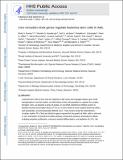| dc.contributor.author | Puram, Rishi V. | |
| dc.contributor.author | Kowalczyk, Monika S. | |
| dc.contributor.author | de Boer, Carl G. | |
| dc.contributor.author | Schneider, Rebekka K. | |
| dc.contributor.author | Miller, Peter G. | |
| dc.contributor.author | McConkey, Marie | |
| dc.contributor.author | Tothova, Zuzana | |
| dc.contributor.author | Tejero, Héctor | |
| dc.contributor.author | Heckl, Dirk | |
| dc.contributor.author | Järås, Marcus | |
| dc.contributor.author | Chen, Michelle C. | |
| dc.contributor.author | Li, Hubo | |
| dc.contributor.author | Tamayo, Alfred | |
| dc.contributor.author | Cowley, Glenn S. | |
| dc.contributor.author | Rozenblatt-Rosen, Orit | |
| dc.contributor.author | Al-Shahrour, Fatima | |
| dc.contributor.author | Ebert, Benjamin L. | |
| dc.contributor.author | Regev, Aviv | |
| dc.date.accessioned | 2018-07-03T14:49:58Z | |
| dc.date.available | 2018-07-03T14:49:58Z | |
| dc.date.issued | 2016-04 | |
| dc.date.submitted | 2016-01 | |
| dc.identifier.issn | 0092-8674 | |
| dc.identifier.issn | 1097-4172 | |
| dc.identifier.uri | http://hdl.handle.net/1721.1/116753 | |
| dc.description.abstract | Leukemia stem cells (LSCs) have the capacity to self-renew and propagate disease upon serial transplantation in animal models, and elimination of this cell population is required for curative therapies. Here, we describe a series of pooled, in vivo RNAi screens to identify essential transcription factors (TFs) in a murine model of acute myeloid leukemia (AML) with genetically and phenotypically defined LSCs. These screens reveal the heterodimeric, circadian rhythm TFs Clock and Bmal1 as genes required for the growth of AML cells in vitro and in vivo. Disruption of canonical circadian pathway components produces anti-leukemic effects, including impaired proliferation, enhanced myeloid differentiation, and depletion of LSCs. We find that both normal and malignant hematopoietic cells harbor an intact clock with robust circadian oscillations, and genetic knockout models reveal a leukemia-specific dependence on the pathway. Our findings establish a role for the core circadian clock genes in AML. | en_US |
| dc.description.sponsorship | National Institutes of Health (U.S.) (Grant P01 CA066996) | en_US |
| dc.description.sponsorship | National Institutes of Health (U.S.) (Grant R01 HL082945) | en_US |
| dc.description.sponsorship | National Cancer Institute (U.S.) (Grant P30-CA14051) | en_US |
| dc.publisher | Elsevier | en_US |
| dc.relation.isversionof | http://dx.doi.org/10.1016/J.CELL.2016.03.015 | en_US |
| dc.rights | Creative Commons Attribution-Noncommercial-Share Alike | en_US |
| dc.rights.uri | http://creativecommons.org/licenses/by-nc-sa/4.0/ | en_US |
| dc.source | PMC | en_US |
| dc.title | Core Circadian Clock Genes Regulate Leukemia Stem Cells in AML | en_US |
| dc.type | Article | en_US |
| dc.identifier.citation | Puram, Rishi V. et al. “Core Circadian Clock Genes Regulate Leukemia Stem Cells in AML.” Cell 165, 2 (April 2016): 303–316 © 2016 Elsevier Inc | en_US |
| dc.contributor.department | Massachusetts Institute of Technology. Department of Biology | en_US |
| dc.contributor.mitauthor | Regev, Aviv | |
| dc.relation.journal | Cell | en_US |
| dc.eprint.version | Author's final manuscript | en_US |
| dc.type.uri | http://purl.org/eprint/type/JournalArticle | en_US |
| eprint.status | http://purl.org/eprint/status/PeerReviewed | en_US |
| dc.date.updated | 2018-07-03T13:16:37Z | |
| dspace.orderedauthors | Puram, Rishi V.; Kowalczyk, Monika S.; de Boer, Carl G.; Schneider, Rebekka K.; Miller, Peter G.; McConkey, Marie; Tothova, Zuzana; Tejero, Héctor; Heckl, Dirk; Järås, Marcus; Chen, Michelle C.; Li, Hubo; Tamayo, Alfred; Cowley, Glenn S.; Rozenblatt-Rosen, Orit; Al-Shahrour, Fatima; Regev, Aviv; Ebert, Benjamin L. | en_US |
| dspace.embargo.terms | N | en_US |
| dc.identifier.orcid | https://orcid.org/0000-0001-8567-2049 | |
| mit.license | OPEN_ACCESS_POLICY | en_US |
